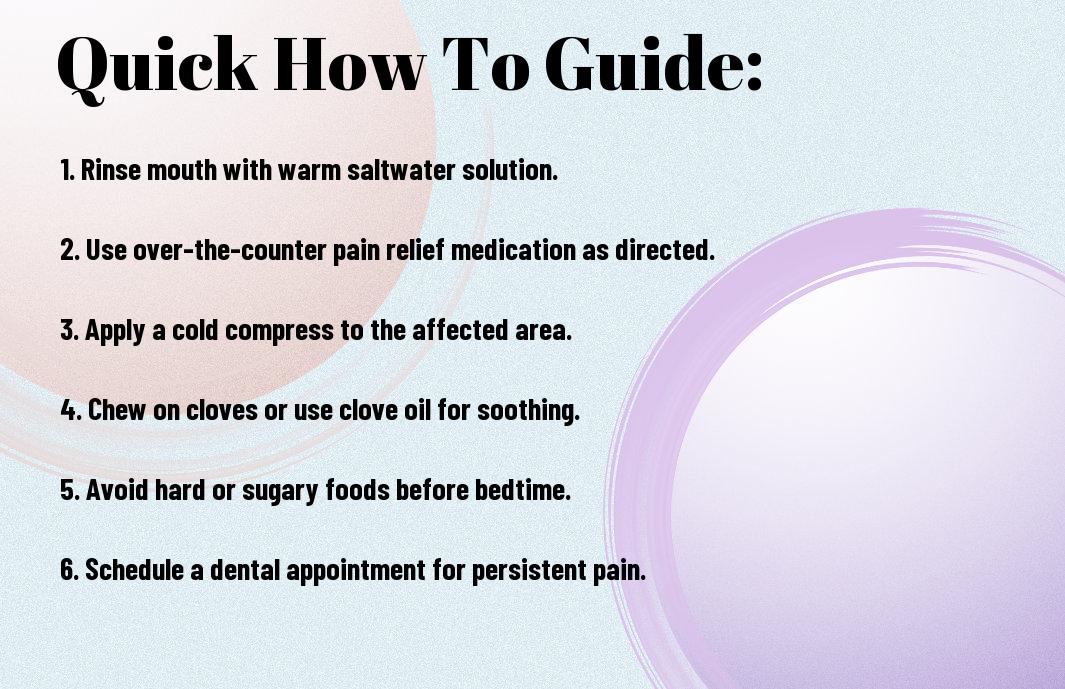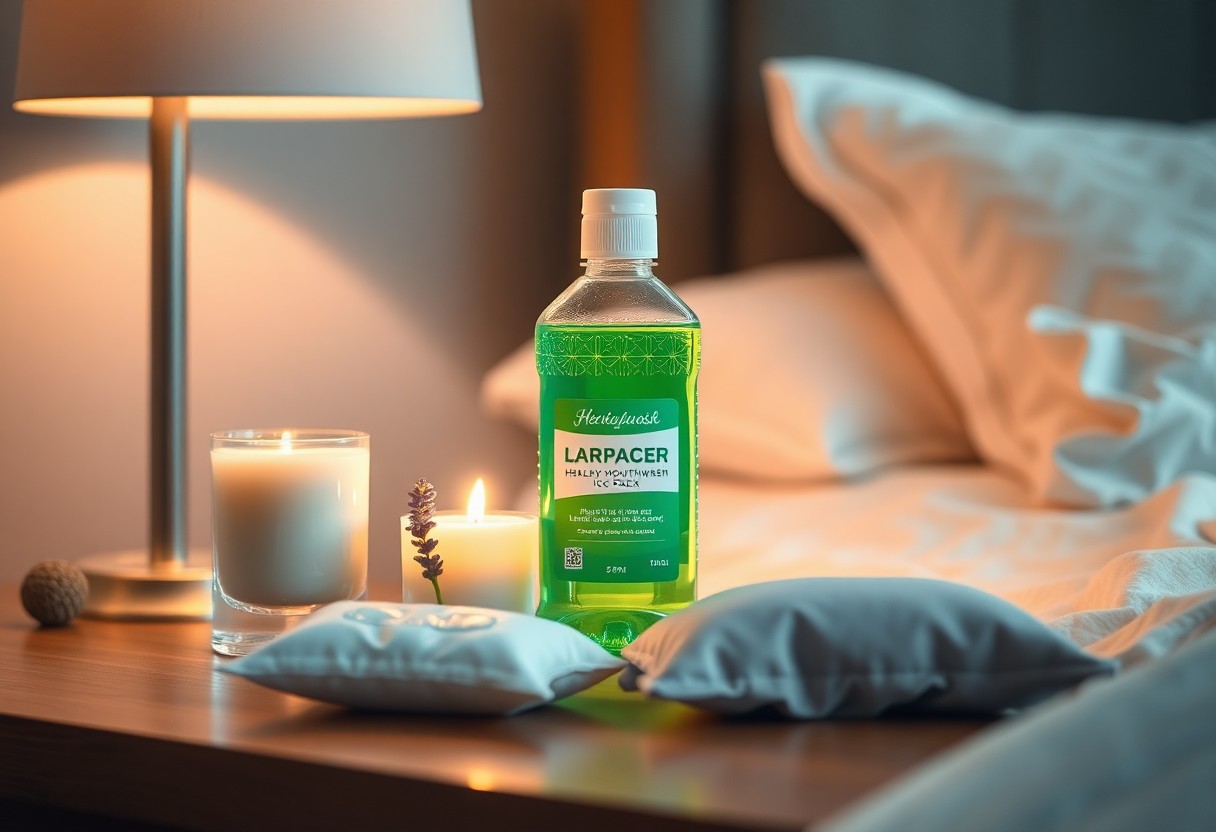Most people have experienced the discomfort of a toothache during the night, which can disrupt your sleep and lead to increased stress. Fortunately, you can take several steps to alleviate your pain effectively. In this post, we’ll explore various remedies and techniques you can use to help stop a toothache, ensuring you get the rest you need. From over-the-counter solutions to natural remedies, you’ll discover the best approaches to soothe your discomfort until you can consult a dentist.
Key Takeaways:
- Oral Hygiene: Maintain a consistent oral hygiene routine to reduce the chances of toothache, including brushing and flossing before bed.
- Warm Salt Water Rinse: Use a warm salt water rinse to alleviate pain and reduce inflammation caused by irritants.
- Cold Compress: Apply a cold compress to the outside of your cheek to numb the affected area and temporarily relieve pain.
- Over-the-Counter Pain Relief: Consider using over-the-counter pain relievers, like ibuprofen or acetaminophen, to manage discomfort.
- Dental Consultation: Schedule a visit to your dentist at the earliest opportunity to address the underlying cause of the toothache.

Understanding Toothache
A toothache can be an unsettling experience, especially at night when your mind is racing and there’s nothing but the darkness to accompany your pain. It can stem from various dental issues, and understanding the root cause of your discomfort is important in addressing it effectively. Whether it’s a minor sensitivity or a sign of a more serious problem, recognizing the signs can help you find relief faster and might prevent a sleepless night filled with discomfort.
Common Causes of Toothache
If you’re facing a toothache, it’s important to identify the common causes behind this discomfort. Dental decay, gum disease, and injury can lead to inflammation and pain. Additionally, cracked teeth or even sinus infections can mimic dental pain. By pinpointing the cause, you can take appropriate measures to alleviate your discomfort and seek the necessary treatment.
Factors That Worsen Pain at Night
Factors that contribute to worsening tooth pain at night can include increased blood flow, teeth grinding, and pressure from sleeping positions. Here are some elements to consider:
- Increased sensitivity due to temperature changes
- Pressure from biting down or clenching your jaw
- Changes in your body’s position when lying down
Any underlying conditions can amplify your discomfort and make it more difficult to find relief.
Causes of toothache can vary, but several factors may be influencing the severity of your pain at night. In addition to the earlier points, anxiety and stress can lead to muscle tension, causing you to clench your jaw unconsciously. Here’s a list of focused factors to consider:
- Dietary habits that contribute to acidity or decay
- Improper dental hygiene leading to plaque buildup
- Existing dental restorations that may have issues
Any of these factors could be making your nightly toothache more intense, highlighting the importance of understanding your individual situation.
Immediate Relief Strategies
It is crucial to address toothache quickly, especially at night when discomfort can feel more intense. By employing various immediate relief strategies, you can find some comfort until you seek professional dental care. This section will explore effective methods to help you manage tooth pain effectively.
Home Remedies for Quick Relief
One simple remedy you can try is a warm saltwater rinse. Mix half a teaspoon of salt into a glass of warm water and swish it around in your mouth for about 30 seconds. This can help reduce inflammation and cleanse your oral cavity. Additionally, applying a cold compress to the outside of your cheek can numb pain and lessen swelling.
Over-the-Counter Solutions
Even in the midst of discomfort, there are effective over-the-counter options available to relieve your toothache. Nonsteroidal anti-inflammatory drugs (NSAIDs), such as ibuprofen or acetaminophen, can help reduce pain and inflammation quickly.
Relief can also be found through topical analgesics, which contain ingredients like benzocaine to numb the affected area. These products are easy to apply directly to the painful tooth and gum tissue. However, while these solutions can alleviate pain temporarily, it’s important to follow instructions carefully and consult a healthcare professional if pain persists, as this could indicate a more serious issue requiring dental intervention.
Long-Term Prevention Tips
For effective prevention of nighttime toothaches, consider adopting these habits:
- Brush your teeth twice daily with fluoride toothpaste.
- Floss daily to remove food particles and plaque.
- Maintain a balanced diet and limit sugary snacks.
- Stay hydrated to promote saliva production.
- Use a mouthguard if you grind your teeth at night.
This combination of practices will help you reduce the risk of developing toothaches over time.
Dental Hygiene Practices
To maintain optimal dental hygiene, ensure you use a soft-bristled toothbrush and replace it every three to four months. Additionally, incorporate an antibacterial mouthwash into your routine to further reduce germs and plaque buildup. Regularly clean your tongue as well, as bacteria can accumulate there and contribute to oral issues.
Regular Check-ups and Professional Care
Even with good dental hygiene, it’s important to have regular check-ups. Scheduling visits with your dentist at least twice a year allows for early detection of potential problems, such as cavities or gum disease. Your dentist can provide personalized advice and professional cleanings that home care alone can’t achieve.
Tips for maximizing your check-up effectiveness include being open about any pain or sensitivity you experience. This will help your dentist pinpoint issues during examinations. Additionally, asking questions about preventive measures can better equip you to maintain dental health. Investing time in these appointments will create a solid foundation for long-lasting oral wellness.
Natural Remedies to Consider
Now that you are seeking ways to alleviate your toothache at night, consider exploring natural remedies that can provide relief. These alternatives can help soothe your pain and make your sleep more restful. Incorporating ingredients available at home can be both effective and gentle on your system. Always proceed with caution, and consult your dentist if symptoms persist.
Herbal Solutions
With nature’s bounty at your disposal, herbal solutions can be a great choice for managing toothache. Herbs like clove, garlic, and turmeric are well-known for their anti-inflammatory and analgesic properties. You can create a paste using these ingredients or simply chew on cloves to release their natural oils for quick pain relief.
Essential Oils for Pain Relief
Oils such as peppermint and tea tree oil can offer significant pain relief when you experience a toothache. They possess strong analgesic and antibacterial properties, which help to diminish discomfort and fight infection. You can apply a diluted solution of these oils to the affected area using a cotton ball for targeted relief.
Understanding the role of imperative oils in combating tooth pain can empower you to manage discomfort effectively. You may find that peppermint oil, with its cooling sensation, provides immediate relief, while tea tree oil’s antiseptic qualities help prevent further complications. Always dilute oils before application and limit usage to avoid irritation. If your symptoms continue, seek advice from a professional to ensure proper care.

When to Seek Professional Help
All toothaches can become more pronounced at night, making it crucial to recognize when to seek professional help. If your pain is severe, persists for more than a couple of days, or is accompanied by swelling or fever, it’s time to contact your dentist. For more information, consider checking out 8 Methods To Get Rid Of Unbearable Toothache At Night. Early intervention can prevent more extensive dental issues.
Signs You Should Visit a Dentist
Any sudden or extreme pain, sensitivity to hot or cold, or visible damage to your tooth are signs that you should visit a dentist. If you notice swelling in your gums or face, or if your pain is radiating to other areas, it’s best to get professional assessment as soon as possible.
What to Expect During Your Appointment
The appointment typically begins with a thorough examination of your teeth and gums, where the dentist will ask about your symptoms in detail to pinpoint the cause of your toothache.
During your visit, the dentist may take X-rays to identify any underlying issues that aren’t visible. You can expect them to discuss treatment options based on the diagnosis, which might include fillings, root canals, or other interventions. The process will also involve pain management solutions tailored specifically for you, ensuring that your discomfort is minimized throughout the appointment.
Lifestyle Changes for Better Oral Health
After implementing specific lifestyle changes, you can significantly enhance your oral health and reduce the likelihood of experiencing toothaches at night. These modifications are designed to support better dental hygiene and overall well-being, empowering you to take control of your oral health. Simple practices such as regular dental check-ups and proper brushing techniques can go a long way in preventing tooth-related issues.
Dietary Adjustments
Adjustments in your diet can positively influence your oral health. Focus on incorporating more fruits and vegetables while reducing sugary and acidic foods that may harm your teeth. Drinking plenty of water throughout the day helps neutralize acids in your mouth and rinse away food particles. Additionally, consider moderating your intake of snacking to minimize the time your teeth are exposed to harmful substances.
Stress Management Techniques
Any effective approach to improving your dental health involves managing stress levels. High stress can lead to teeth grinding (bruxism), which causes tooth pain and damage. Implementing techniques such as yoga, meditation, or deep-breathing exercises can help alleviate stress, thereby protecting your teeth and gums. Make time for activities that bring you joy and relaxation, contributing to your overall oral health.
Plus, incorporating regular physical activity into your routine can have significant benefits for both your mental and oral health. Exercise releases endorphins, which act as natural stress relievers. Establishing a balanced sleep schedule also plays a vital role in managing stress, as insufficient sleep can heighten anxiety and adversely impact your dental health. Prioritizing these stress management techniques enables you to maintain a healthier mouth and a more peaceful state of mind.
Final Words
As a reminder, managing a toothache at night involves a combination of effective strategies to alleviate pain and promote comfort. You can use over-the-counter pain relievers, apply a cold compress, and practice good oral hygiene to effectively minimize discomfort. Maintaining a consistent dental care routine and scheduling an appointment with your dentist will ultimately help address the underlying issues causing your toothache. By taking these steps, you can ensure that you find relief when it matters most, allowing you to rest easier during the night.
FAQ
Q: What home remedies can I use to alleviate toothache at night?
A: There are several home remedies that may help ease toothache symptoms during the night. A popular choice is a warm saltwater rinse, which can reduce inflammation and help cleanse the affected area. Another option is applying a cold compress to the outside of your cheek near the painful area; this can help numb the pain and reduce swelling. Additionally, clove oil has natural analgesic properties; applying a small amount to the painful tooth using a cotton ball can provide temporary relief.
Q: Should I take over-the-counter medication for toothache relief?
A: Yes, over-the-counter medications can be effective in managing toothache pain during the night. Non-prescription pain relievers such as ibuprofen or acetaminophen can provide temporary relief by reducing inflammation and alleviating discomfort. Follow the recommended dosage instructions on the packaging. If the pain persists, it is advisable to consult a dentist for further evaluation and treatment.
Q: When should I seek professional help for my toothache?
A: If your toothache persists for more than a day or two, or if the pain is severe and does not improve with home remedies or over-the-counter medications, it is necessary to consult a dentist. Additionally, if you experience other symptoms such as fever, swelling, or difficulty swallowing, seek immediate dental care. Early intervention can prevent complications and provide a more effective resolution to the underlying issue causing the toothache.






